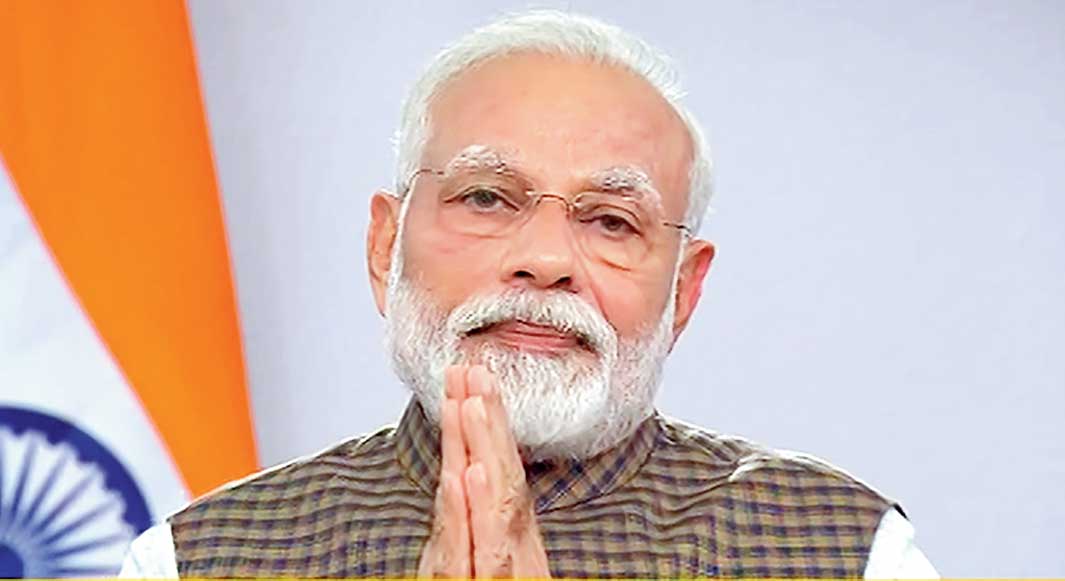Right on point
No sooner had the prime minister, Narendra Modi, announced his ‘9 minutes at 9 pm’ plan of what has been done in Italy and the United Kingdom to break the monotony of the Covid-19-induced isolation, than the floodgates burst open on social media. People had a field day taking digs at the PM’s announcement — citizens were urged to switch off the lights in their homes for 9 minutes at 9 pm on April 5, and light lamps instead — recalling how his previous ‘obedience test’, in which citizens had clapped and clanged vessels upon his instructions, had defeated the whole purpose of the ‘janata curfew’. Of the various parallels drawn, there was one on Twitter that was the most accurate. It was published under a handle that goes by the name, ‘Nirmala Tai’. “Whole [sic] India feels like Big Boss house. Indians are locked in their houses and Big Boss Modi ji keeps giving weekly tasks.” Anyone who watches reality shows will have to concede that this observation is spot on.
Uncomfortable moments
The critics of the Nyuntam Aay Yojana in the Congress had a few uncomfortable moments when most social scientists and economists portrayed Nyay as the panacea for the poor in these exceptional times, when the coronavirus-induced lockdown has taken the life out of the already-enervated economy. Rahul Gandhi, who was enamoured of the minimum income guarantee scheme from the very beginning, pushed it hard, forcing the party to demand a transfer of Rs 7,500 to the accounts of poor citizens, although the government refused to oblige. One bitter critic of the scheme in the party swiftly changed his opinion after the Nobel prize winner, Abhijit Banerjee, fiercely advocated the adoption of such a scheme to tide over the crisis. He said that this was not the time to worry about undeserving people getting the aid, as money in the hands of the poor was the only way to kickstart the economy again. In the process, the Congress, struggling for legitimacy after the electoral setback, gained some political points as a party with a long-term vision.
Great controversy
The Tablighi Jamaat was used by the supporters of the Rashtriya Swayamsevak Sangh and the Bharatiya Janata Party to give a communal tinge to the deadly coronavirus and berate secular liberals. But there were few sympathizers of the group among the secular intellectuals as well as ordinary Muslims. Many in the Muslim community felt that the Tablighi Jamaat was not only responsible for religious orthodoxy but its apolitical attitude was weakening the fight against the RSS-BJP. Muslim activists angrily condemned its stupidity in the time of Covid-19 and linked it to its disconnect with socio-political concerns. Some even suggested that it had excellent relations with Narendra Modi in Gujarat and Ajit Doval in Delhi. It has always persuaded Muslims to concentrate on religious affairs instead of fighting for political and social rights. The Jamaat had no role to play in the recent anti-Citizenship (Amendment) Act, anti-National Register of Citizens agitation; on the contrary, it discouraged Muslims from intensifying the battle.
Interestingly, the Congress-supported National Herald carried a critical article in the aftermath of the coronavirus controversy instead of defending the group. The article recalled how these people were antithetical to Sufism, opposed liberalism and fuelled religiosity among the Muslim community. The article said, “It [corona] was none of their concern, was the attitude. Whatever the Lord willed would follow in any case. They would rather take care of their after-life. Seldom before have faith and fright crossed paths though because of the indiscretion of a motley band of wayfaring Muslim orthodox revivalists from Tablighi Jamaat. They ignored warnings, held a congregation attended by a large number of visitors from abroad and paid the price by getting infected by the virus.
“Their insular life and indifference to the rest of the community have helped the rabid, communal elements to stigmatise not just the Jamaat but also the entire minority community. The Jamaat and its exclusionary ethos have cost Muslims dearly in a world, which had become increasingly interdependent.”
Crack the whip
The president of the state unit of the BJP in Karnataka, Nalin Kumar Kateel, looks like he is the man in charge. The hardliner, whose appointment did not go down well with the chief minister, BS Yediyurappa, has started cracking the whip by unilaterally deciding that the Kerala border in Kasaragod and Kodagu would remain closed in spite of the directives in a Kerala High Court order. While Yediyurappa has been rather quiet on this issue, it is Kateel who has gone on to prove that he is more than just a state president of the ruling party. Party insiders say that Kateel has become the eyes and ears of the “high command”.











